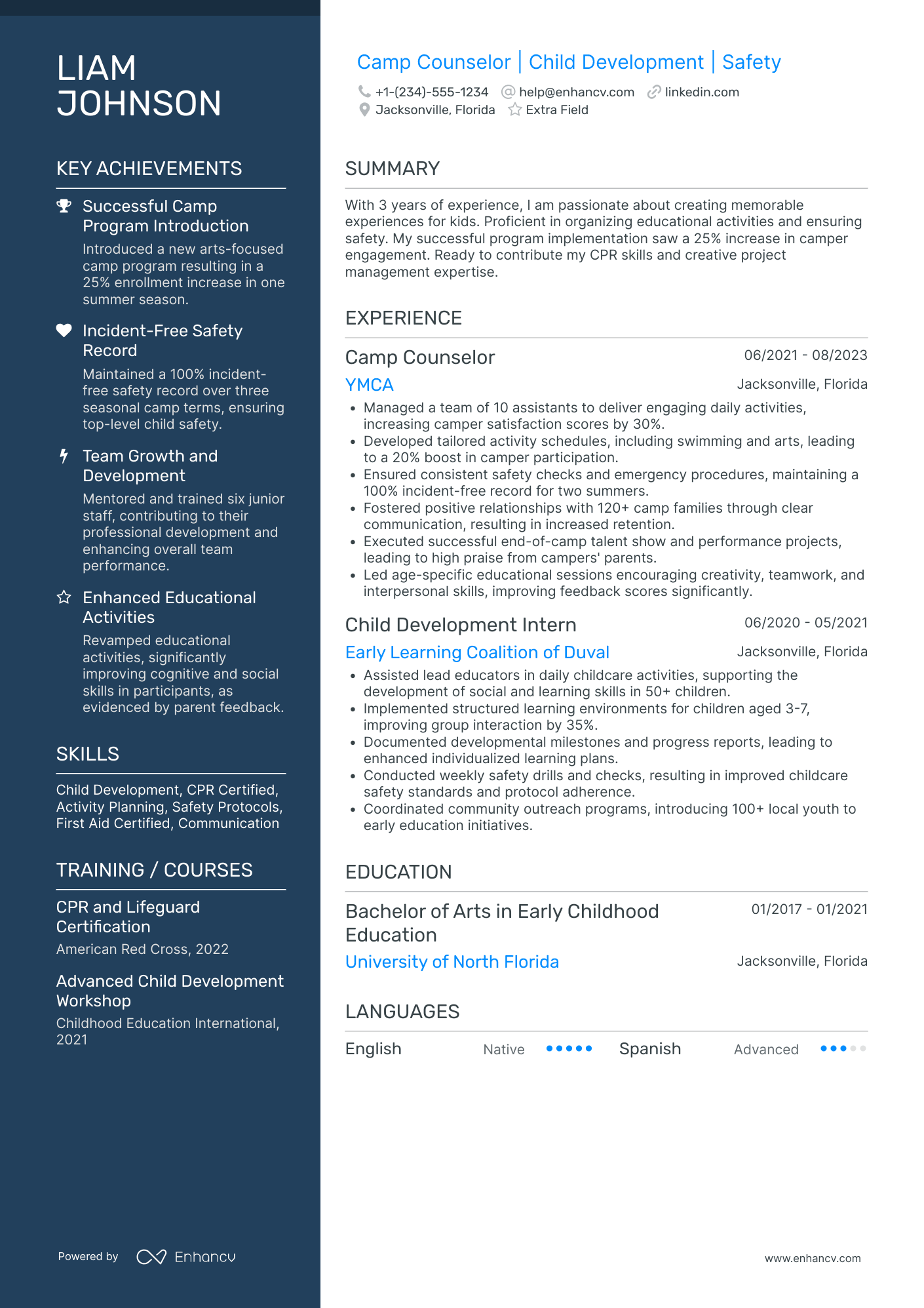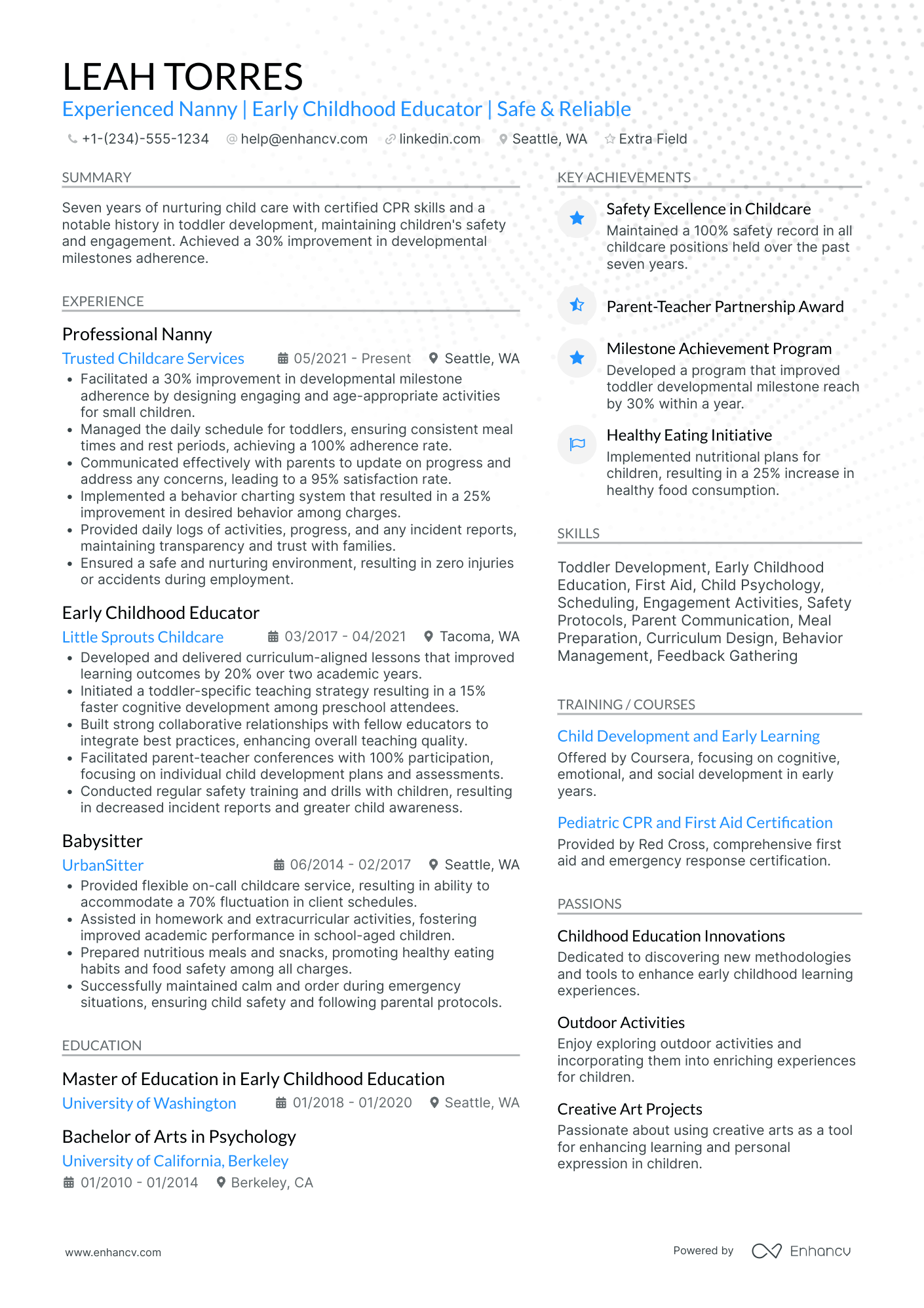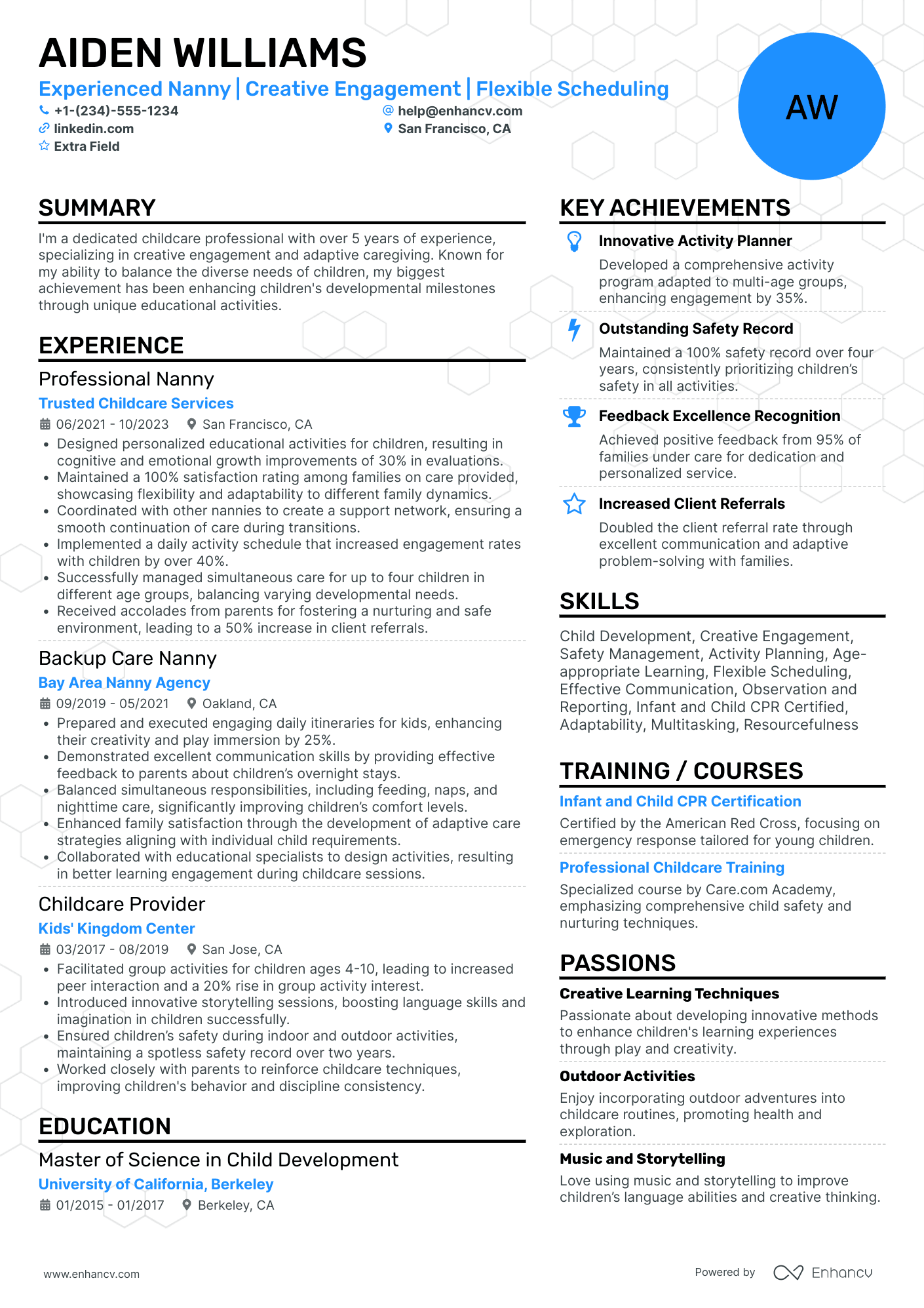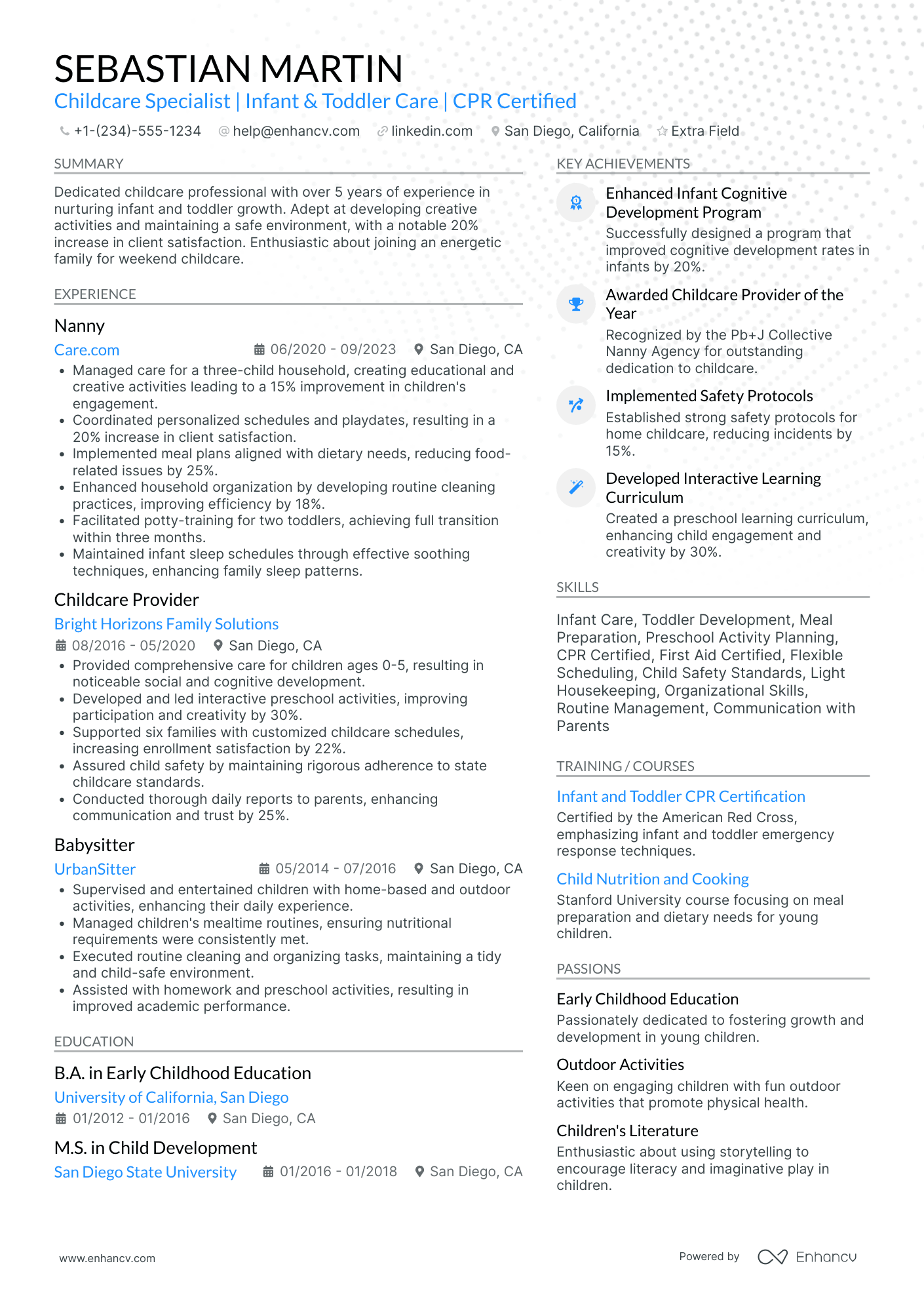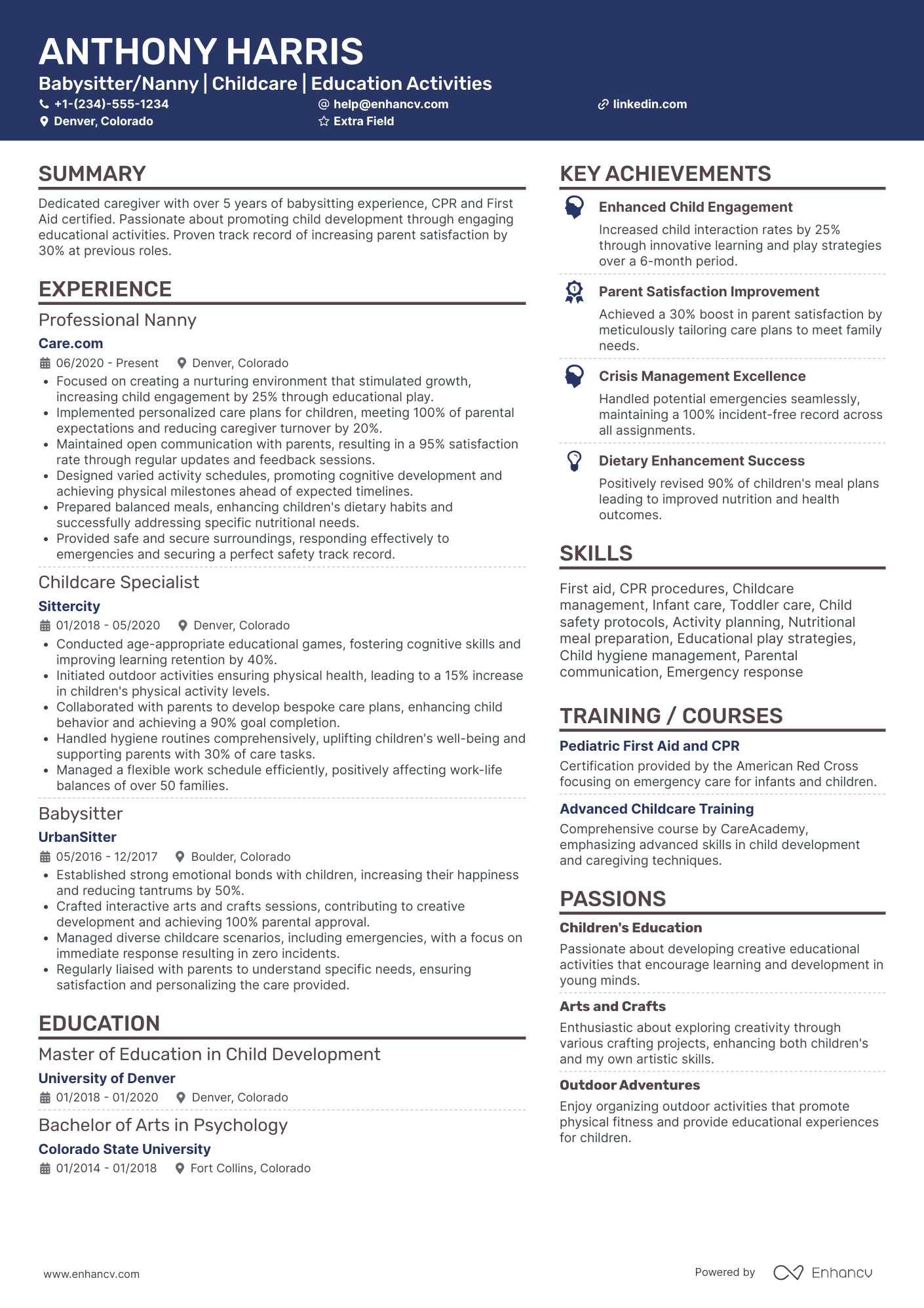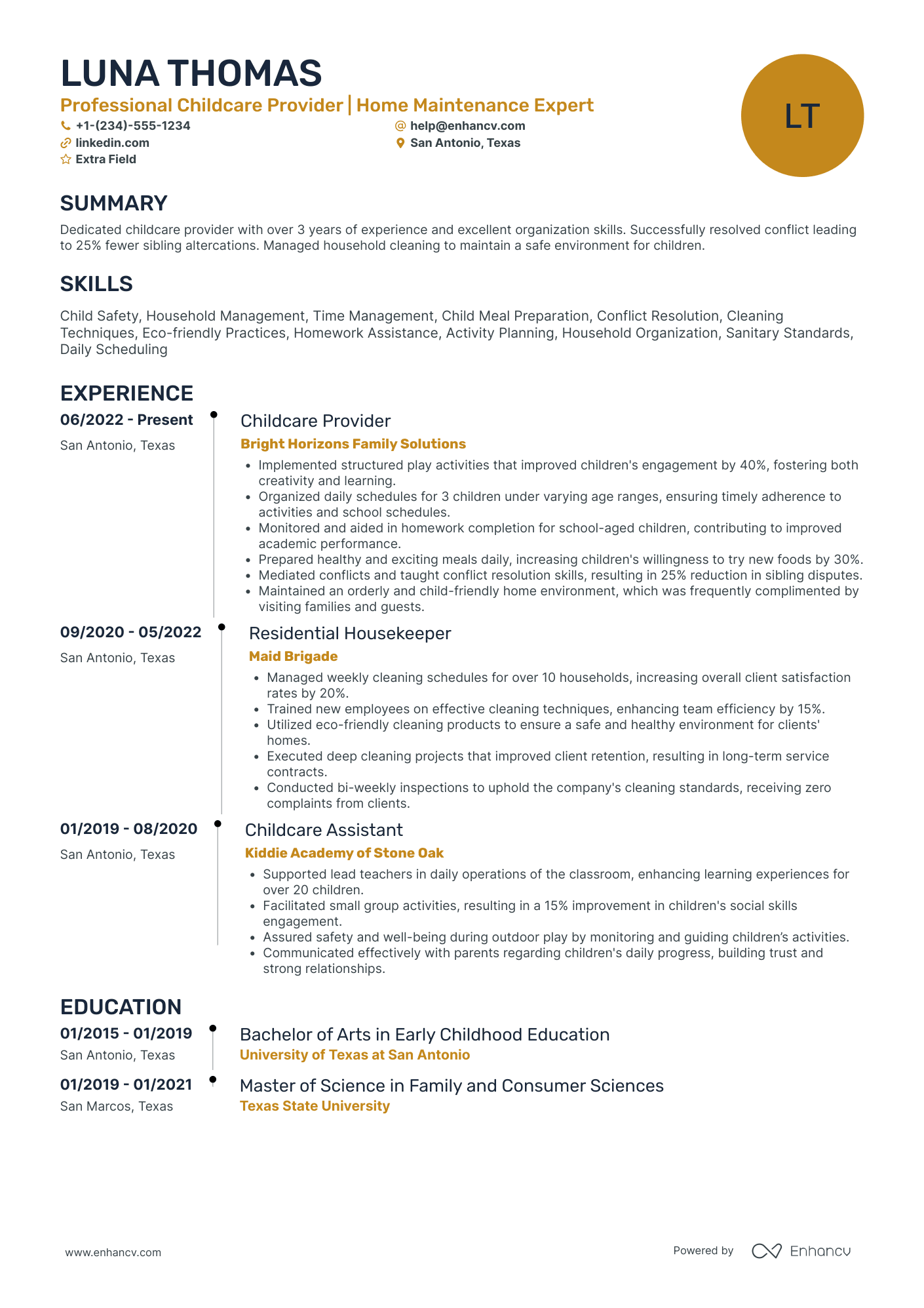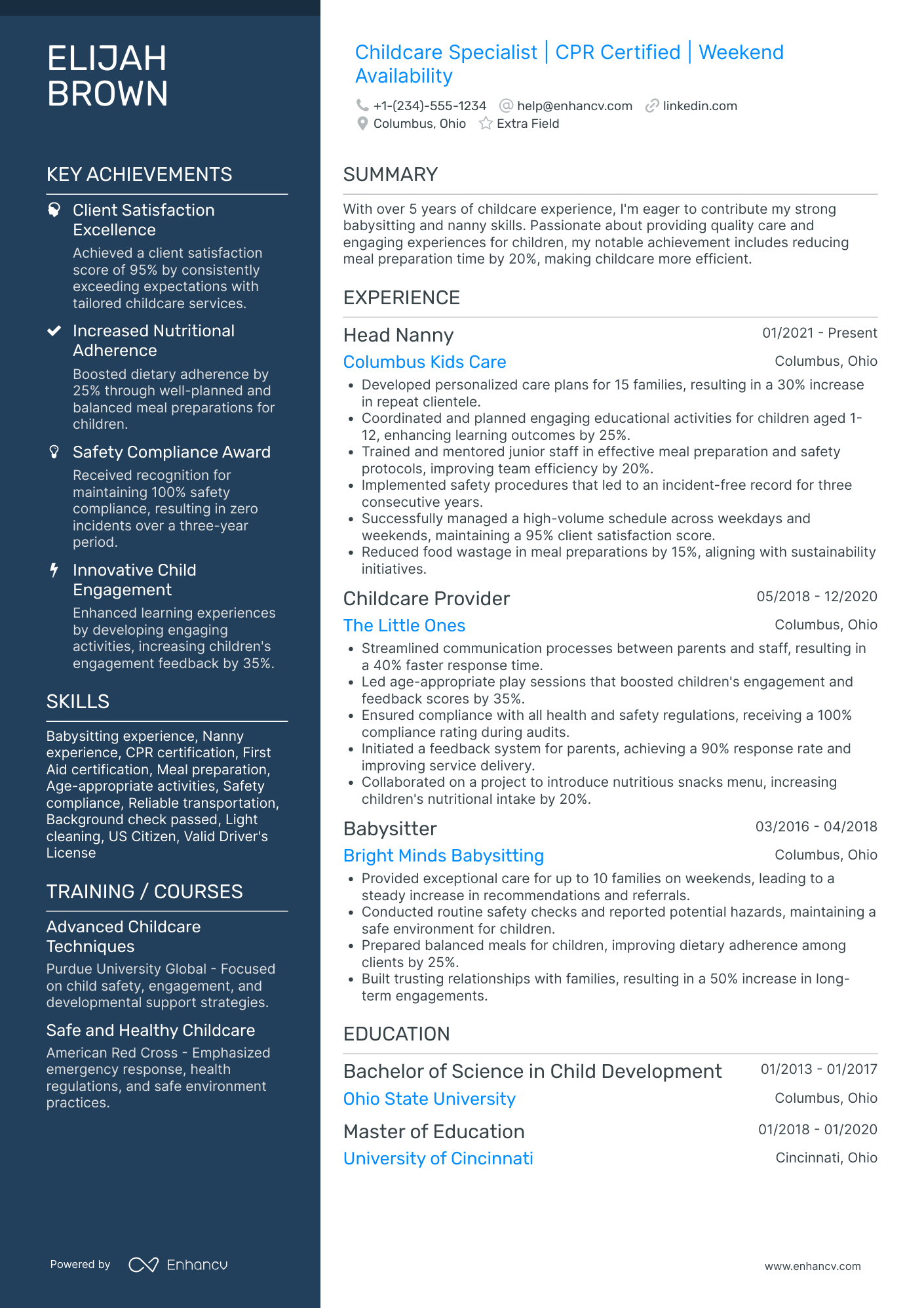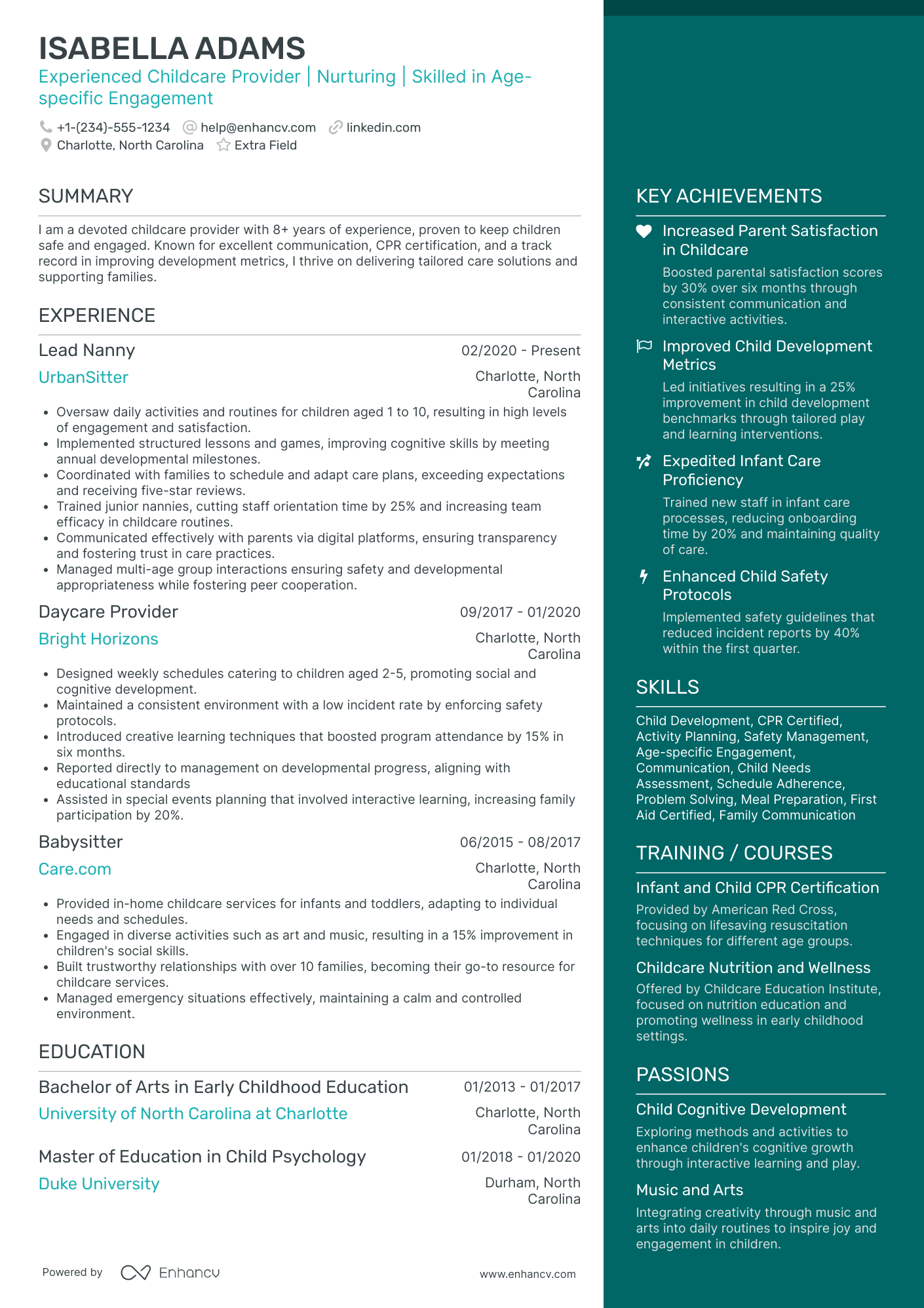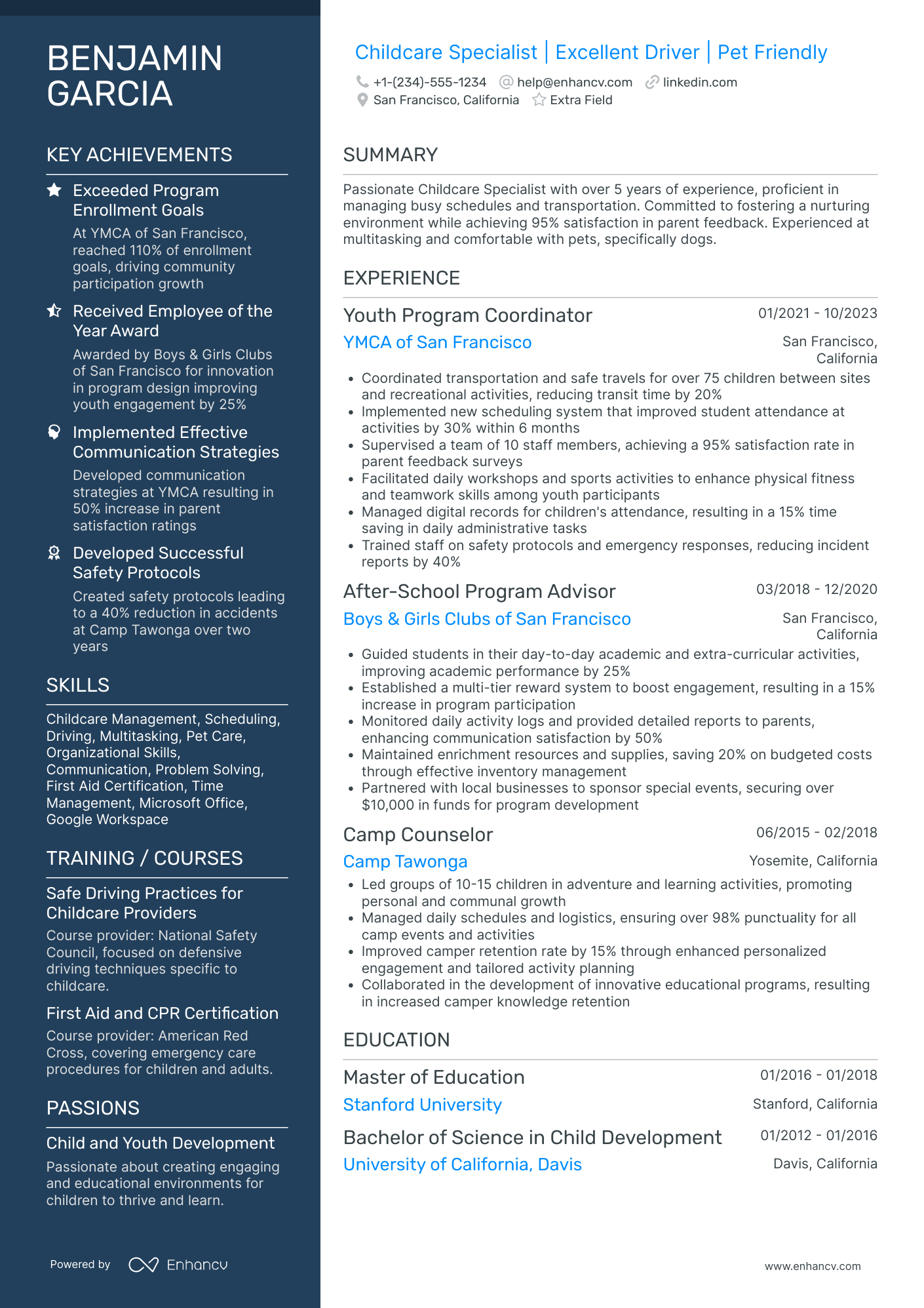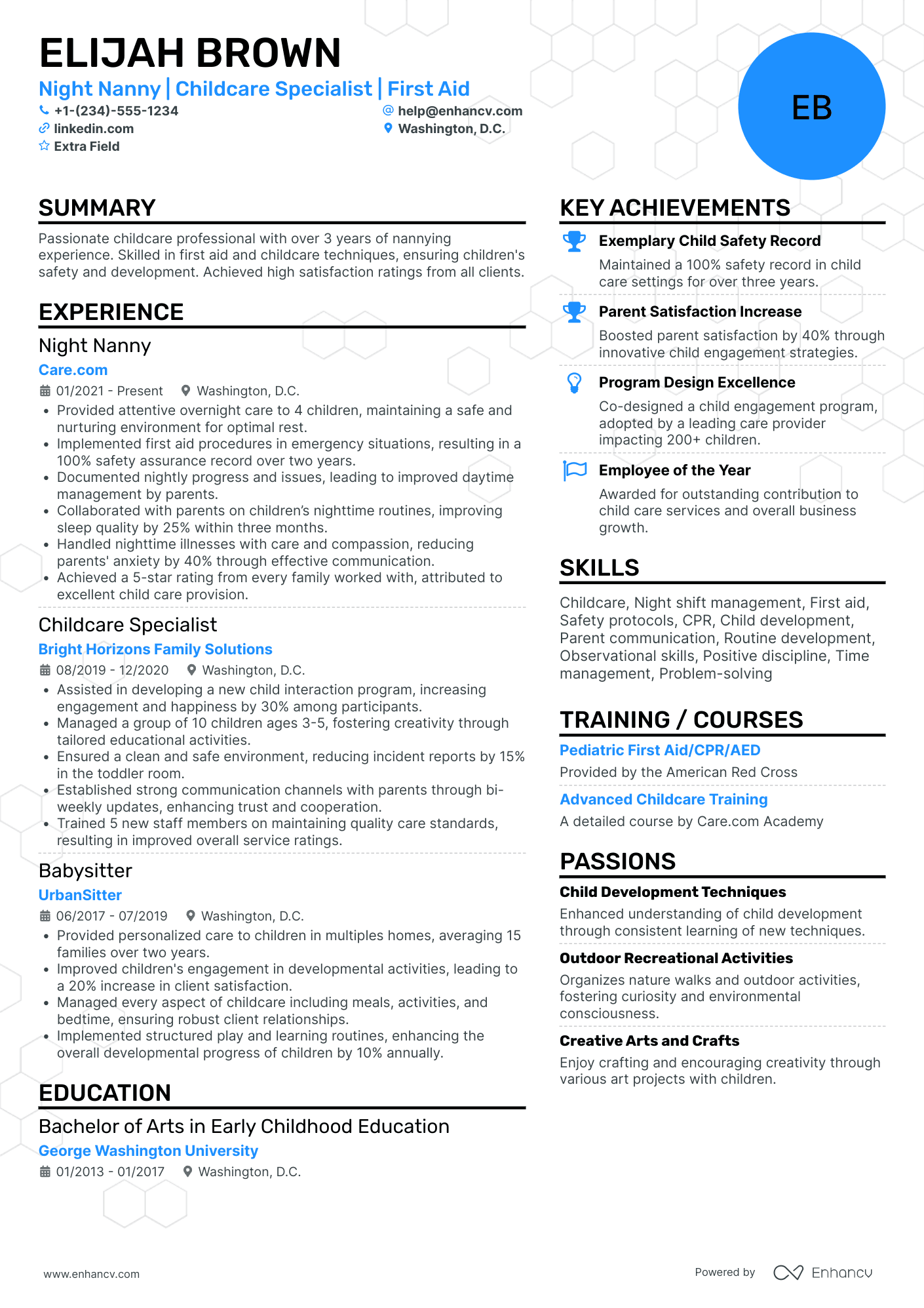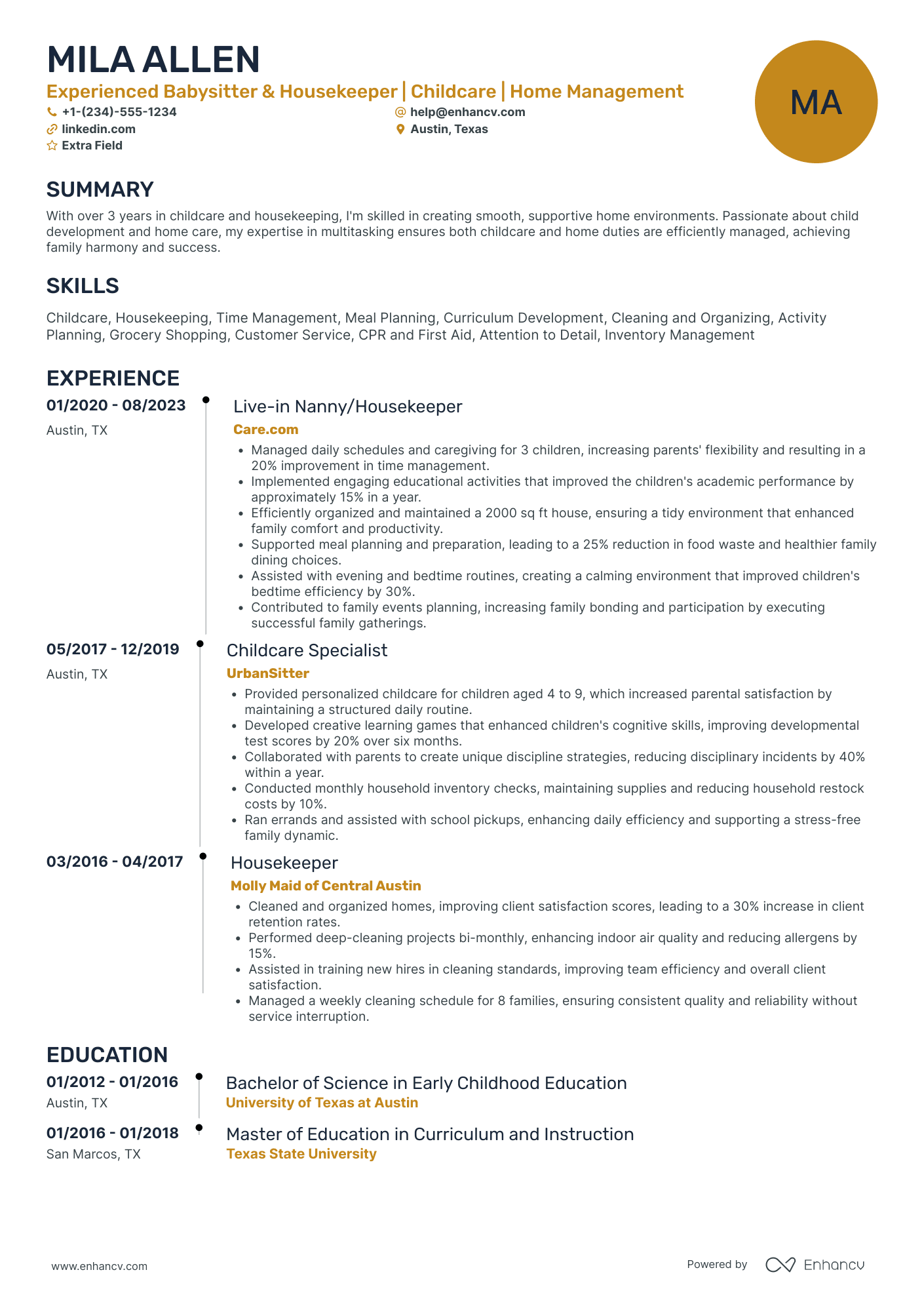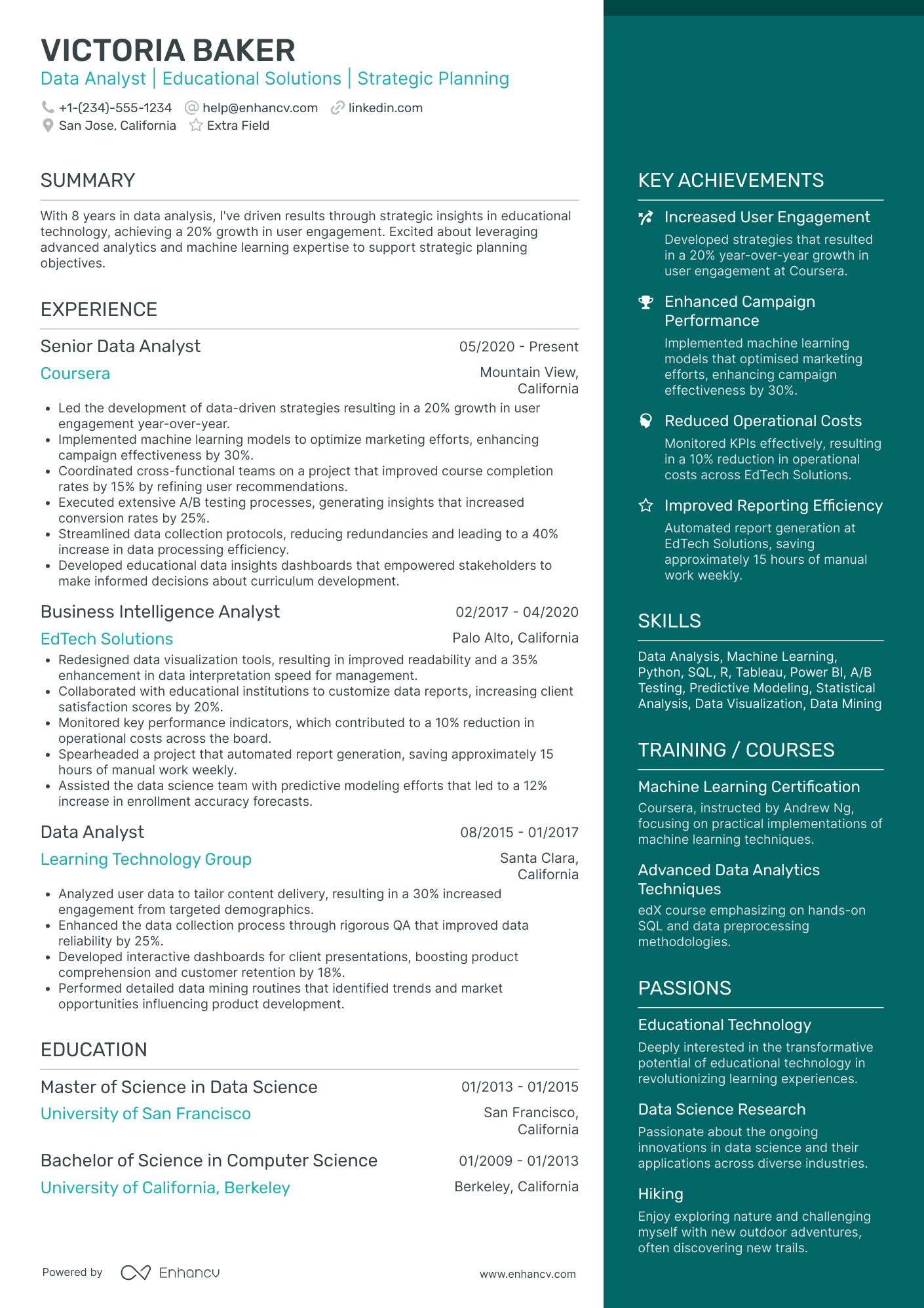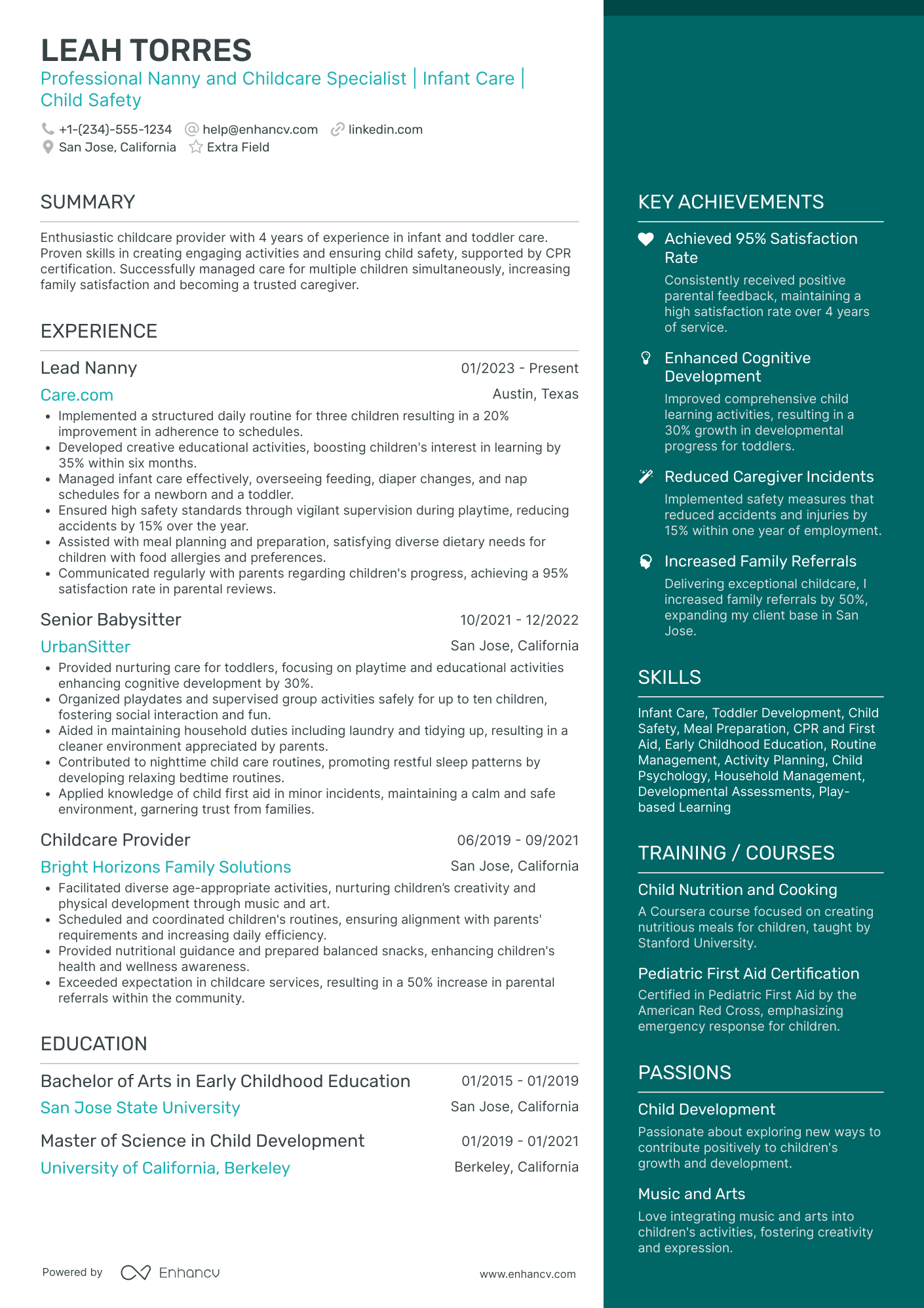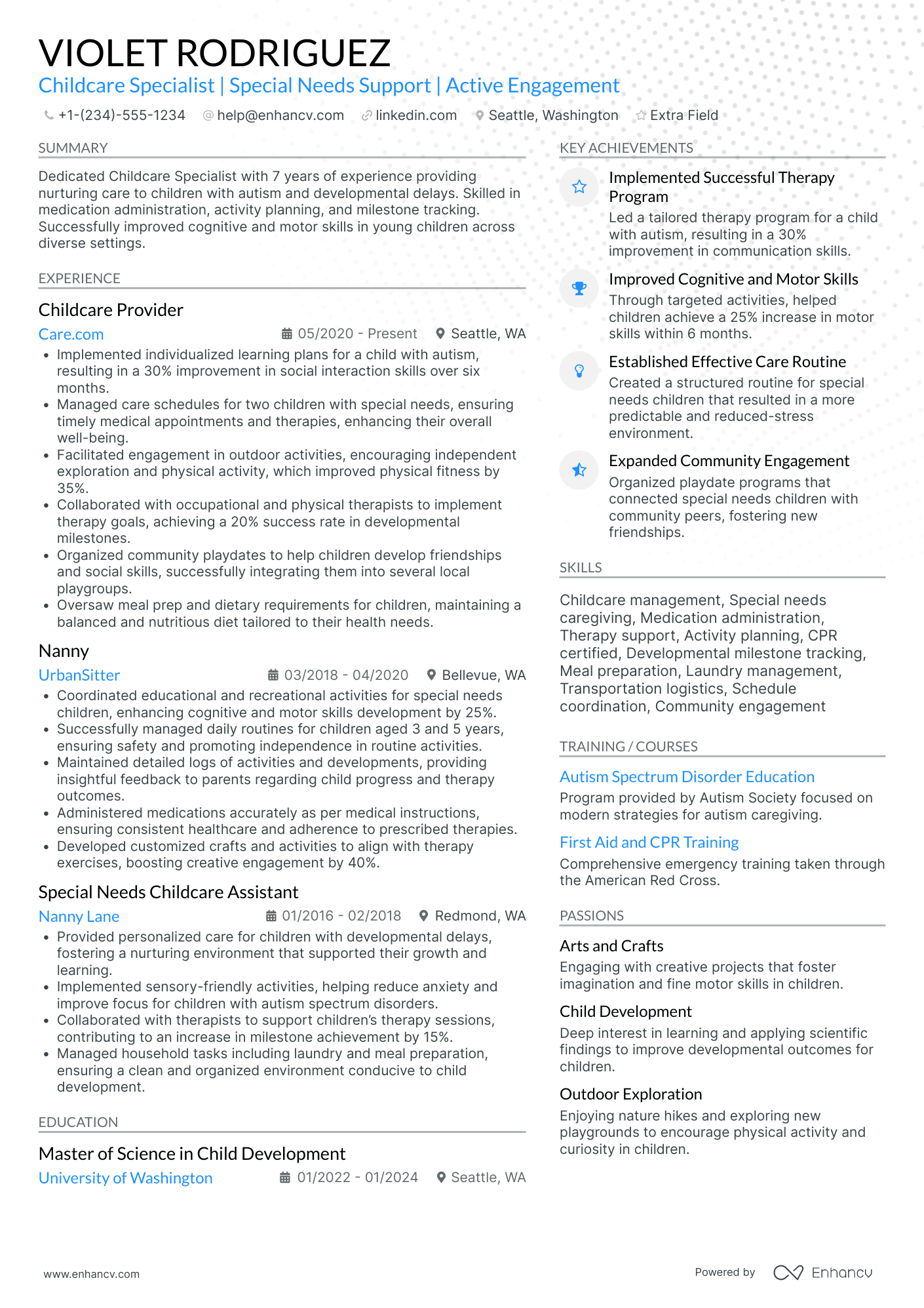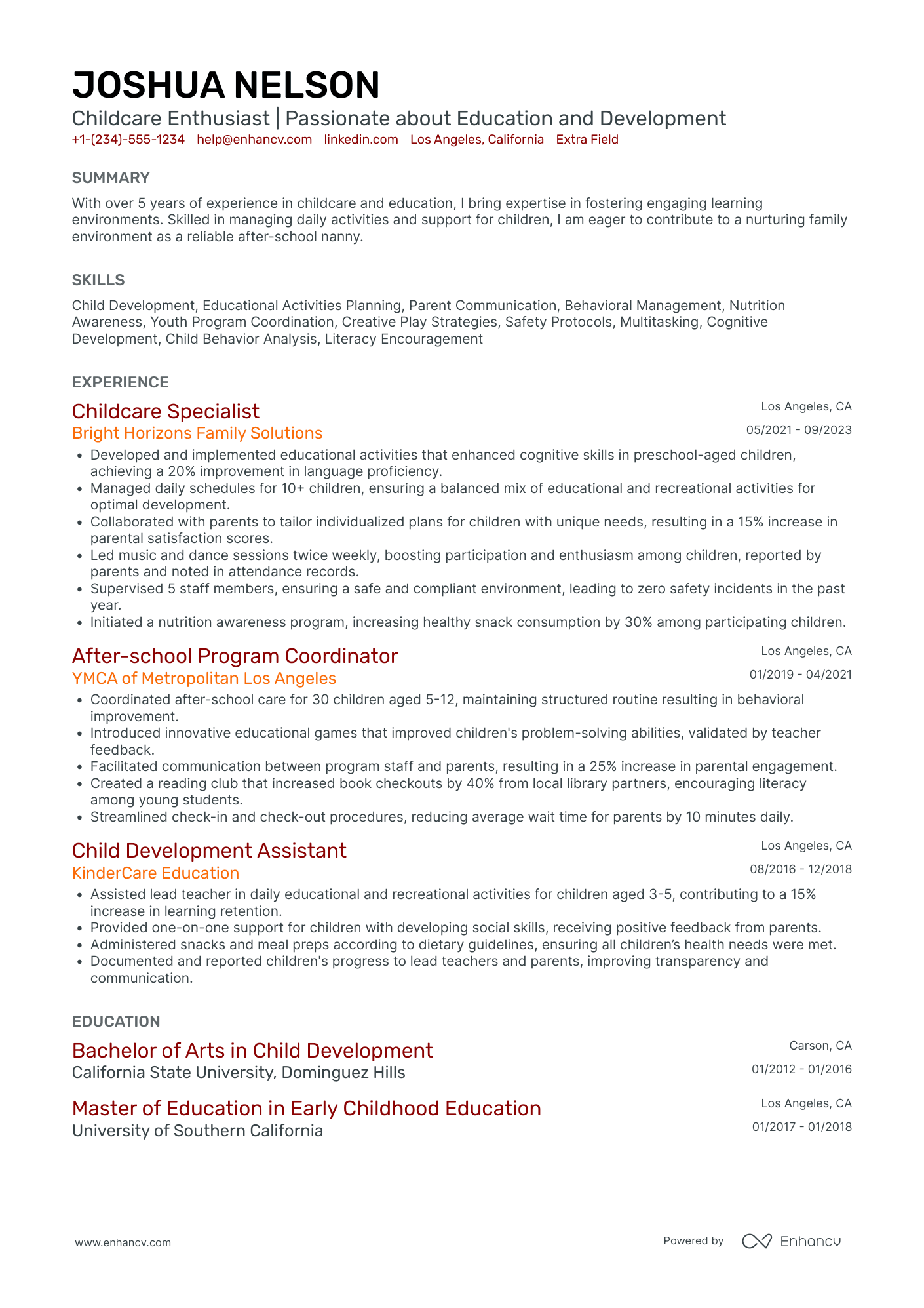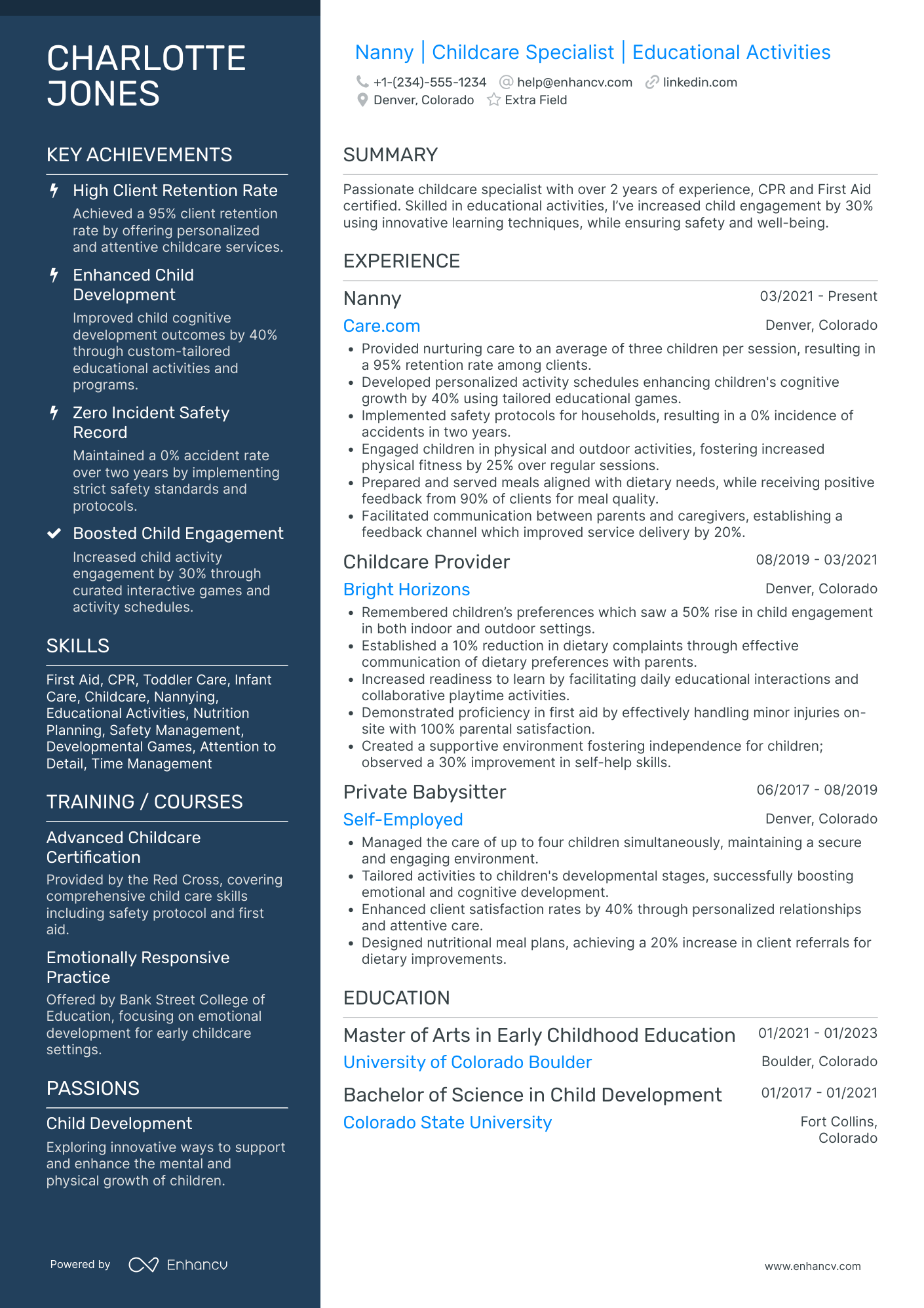Imagine parents scrolling through countless profiles, searching for the perfect caregiver to entrust with their little ones. How can you stand out in this crowd?
In the lively world of childcare, where every day is an adventure and every child a new friend, the journey to finding reliable babysitting opportunities can sometimes feel more challenging than convincing a two-year-old to eat their veggies. Aspiring babysitters face the daunting challenge of securing consistent work amidst a barrage of hopeful applicants and varying expectations.
In this dynamic landscape, where trust is paramount, and safety is non-negotiable, a well-crafted babysitter resume is the key to unlocking doors to fulfilling experiences and meaningful connections with families.
This guide includes examples and pro tips to help you overcome common challenges babysitters face when writing their resumes. It’ll assist you in crafting a resume that showcases your unique talents and capabilities, paving the way to your next unforgettable babysitting adventure.
For additional childcare resume writing guides, check out the following:
- Child Care Director Resume Guide
- Early Childhood Teacher Guide
- Babysitter Cover Letter Guide
- Child Caregiver Resume Guide
- Child Care Provider Resume Guide
- Child Care Teacher Resume Guide
- Child Care Resume Guide
- Child Care Worker Resume Guide
How to format a babysitter resume
Most parents look for fun, experienced, and professional babysitters. While babysitting may be a casual job, your resume should still convey professionalism and your resume's formatting tells potential employers a lot about who you are.
A clean, organized, and carefully proofread resume is the best way to convey that you take the role seriously. Here are a few of the most effective ways to showcase your professionalism and expertise in the world of childcare:
- Professional tone: Maintain a professional tone throughout the resume, avoiding slang, abbreviations, or overly casual language.
- Personalization: Target your resume to the specific job you're applying for by highlighting your most relevant experiences and skills. If you're applying to work with infants, emphasize your experience with that age group. If you have experience with children with special needs, mention that as well.
- Include contact information: A prominent header featuring your name, job title, and contact information lets parents easily locate your essentials.
- Keep it simple: To maintain a sleek, professional appearance, avoid using unnecessary creative elements that may distract from your qualifications.
- Be concise: Aim for a one-page resume and use bullet points rather than paragraphs when possible to describe experiences and achievements, making it easier to skim.
- Use clear headings: Ensure your resume sections are organized logically and differentiated using simple, precise headings. Bold headings also help organize information and guide the reader's eye.
- Proofread: Finally, proofread your resume multiple times for spelling, grammar, or formatting errors. Consider having someone else review it as well to catch anything you might have missed.
Different markets have specific resume styles – a Canadian resume, for instance, may require a different approach.
Is your resume good enough?
Drop your resume here or choose a file. PDF & DOCX only. Max 2MB file size.
Here are a few of the most important sections parents look for when reviewing babysitter resumes:
The top sections on a babysitter resume:
- Personal information: This section is necessary as it allows the recruiter to know your basic details like name, age, contact information, and location.
- Career objective: This should be included as it gives a snapshot of your goals and ambitions related to babysitting and what you aim to achieve in this role.
- Work experience: Include this section to showcase your previous babysitting or childcare experience, highlighting specifics about the ages you've worked with, responsibilities, and achievements.
- Skills and abilities: This section should be included to highlight your skills pertinent to babysitting, such as First Aid and CPR certification, cooking abilities, or storytelling skills.
- References: Including this is important as it provides the recruiter with contacts who can vouch for your babysitting capabilities and work ethic.
Within the different sections of your resume, be sure to include the following information to demonstrate your abilities as a responsible and knowledgeable babysitter.
What parents want to see on your resume:
- Child safety knowledge: This is prioritized because a babysitter’s primary role is to ensure the safety and well-being of children in their care.
- Certifications in CPR and first aid: These are crucial as babysitters need to be prepared to handle emergencies, and such certifications demonstrate that readiness.
- Previous babysitting experience: This is often prioritized as it demonstrates familiarity with the responsibilities and challenges of babysitting.
- Creativity and activity planning: Recruiters look for this as it shows the ability to keep children engaged and entertained while fostering their development.
- Flexibility in schedule: This is valued because the need for babysitting often arises outside standard working hours; availability for nights, weekends, or emergency situations is appreciated.
How to write your babysitter resume experience
Experience isn't just a badge of honor in babysitting—it's essential for building trust and confidence for parents. Every interaction adds depth and credibility to your skills, from the tender moments spent comforting a crying toddler to the joyful laughter shared during playtime adventures.
Sharing your babysitting work historythat has shaped you into the capable and reliable caregiver you are today instills confidence in the families you serve.
Expectations and responsibilities can vary significantly from one babysitting job to the next. Therefore, you must provide thorough descriptions of tasks undertaken in prior positions. Specifically, you should target your resume for a particular position by highlighting skills and knowledge valued by the parents. For example, if you have experience working with children in the same age group or with similar special needs as the family you hope to work with.
- Job title: Clearly state your job title as "babysitter" or "Childcare Provider" to indicate your role.
- Dates of employment: Include the start and end dates (month and year) for each babysitting position you've held.
- Employer name: Specify the names of the families or individuals for whom you provided babysitting services. If you worked through a babysitting agency, you name the agency.
- Location: Optionally, you can include the city or area where you provided babysitting services. This can be helpful to demonstrate familiarity with the local area, especially if you’ll accompany the children outside the home.
- Age range of children: Specify the ages of the children you cared for in each position. This helps prospective employers understand your experience with different age groups and tailor their hiring decisions accordingly.
- Responsibilities and achievements: Use bullet points to detail specific tasks in each babysitting role, illustrating your duties and accomplishments, for example, meal preparation, bedtime routines, homework assistance, and engaging children in educational or recreational activities. Highlight any special skills or achievements, such as certifications in CPR and first aid, successful management of challenging behaviors, or positive feedback from parents.
When describing prior work experience, give details and include keywords related to childcare or pulled directly from a job post to ensure parents recognize you’re an excellent match for the position.
The examples below demonstrate how including keywords and adding detail will improve your entries:
- •Cared for two children, aged 4 and 7 on a part-time basis.
- •Prepared meals and after-school snacks.
- •Followed after-school routines, including snack time, homework time, and outdoor activities.
- •Managed challenging behaviors and conflicts.
- •Helped with homework when needed.
This experience example lists tasks the babysitter was responsible for. However, it lacks detail, keywords, and quantitative data. The resulting description may fail to impress parents since the applicant doesn't establish how well they performed these tasks or what resulted from their efforts.
- •Provided exceptional care for two children, aged 4 and 7, on a part-time basis, averaging 20 hours per week.
- •Prepared nutritious meals and snacks according to dietary preferences and restrictions, ensuring children's health and well-being.
- •Implemented effective after-school routines, including snack time, homework time, and outdoor activities, resulting in improved grades and bedtime compliance.
- •Successfully managed challenging behaviors and conflicts with patience and positive reinforcement, promoting emotional intelligence and conflict resolution skills.
- •Tutored eldest child in math, resulting in a 15% increase in the children's report card scores in one grading period.
This improved example not only describes what the applicant did in their prior job but clarifies how well they did it and what they achieved. This results in a work experience that’s sure to impress any parent looking for a responsible, caring babysitter.
They include keywords that are sure to grab attention, such as “exceptional care,” “nutritious meals and snacks,” “health and well-being,” “positive reinforcement,” “promoting emotional intelligence,” and “conflict resolution skills.” They skillfully utilize quantitative data by mentioning the average hours worked and the results of their tutoring efforts. Lastly, they clarify achievements, such as the positive outcomes from their establishment of after-school routines.
How to quantify impact on your resume
Parents take their children's welfare very seriously. An excellent way to impress parents and showcase your positive impact on their children is to highlight quantifiable achievements or milestones that demonstrate the effectiveness of your babysitting skills.
As in the example above, you could mention improvements in a child's academic performance. However, there are numerous options for including numbers and statistics illustrating your babysitting prowess. The examples below are some excellent options for your babysitter resume.
- The number of children cared for at once: This demonstrates your ability to multitask and handle high-pressure situations responsibly.
- The age range of children you've babysat: A wide age range shows versatility and adaptability to different childcare needs. Additionally, age ranges close to the potential family's children establish expertise with the developmental needs and challenges of that age group.
- How many families you've worked with: This reflects your accumulated experience and the trust others have placed in you.
- How long you've been babysitting: This demonstrates your level of experience and commitment to the profession.
- The frequency and length of long-term babysitting contracts: This reflection of reliability and consistency can make the resume more appealing to recruiters and parents.
- The hours of training or number of certifications you've completed: This shows responsibility, dedication to learning, and professional growth.
- How many regular activities or programs you've initiated, and the number of children that participated: This demonstrates your leadership and organizational skills.
- Percentages representing improvements resulting from your efforts: For example, improvements in grade, decreases in sibling quarrels, results of nutrition or exercise efforts, decreases in screentime, etc. These demonstrate an action-based, goal-oriented mindset that will ultimately benefit the children.
How do I write a babysitter resume with no experience
You don’t necessarily need to have worked as a babysitter previously to land a job. However, you’ll need to prove you have childcare skills and experience with children for parents to consider entrusting you with their most precious possessions.
Watching the children of friends or family members, working or volunteering at a youth camp, after-school programs or any other position where you were responsible for young people’s well-being will establish your capabilities.
Follow these steps to write your babysitter resume without relevant experience:
- Look for keyword skills in the job description and brainstorm ways you can highlight these throughout your resume.
- Don’t include irrelevant work experiences or outdated experiences. Instead, emphasize how your previous work, volunteer, or extracurricular experiences demonstrate valuable skills and knowledge for caregivers, such as patience, responsibility, creativity, communication, and problem-solving abilities.
- Include relevant awards or certifications, such as a CPR certification.
- Include quantifiable evidence when possible to verify your stated skills.
- Don’t include irrelevant work experiences or outdated experiences.
- Utilize your personal statement to clarify how you plan to use transferable skills as a babysitter.
How to list your hard and soft skills on your resume
Every babysitter possesses unique skills that transform ordinary moments into extraordinary memories. Whether it's sparking imagination through storytelling, diffusing tantrums with patience and empathy, or fostering a safe and nurturing environment, your babysitting skills are the key to creating unforgettable experiences for the little ones in your care.
From the art of communication to the science of safety, crafting a skills section that showcases your talents, sets you apart as a standout caregiver, and elevates your babysitter resume from ordinary to extraordinary.
To ensure parents have a holistic view of your abilities, you'll need to cover both hard and soft skills.
Hard skills are skills that require study, training, and practice. In babysitting, these skills are often linked to certifications like CPR and first aid.
Be sure to include any of these top hard skills you possess in your babysitter resume's skills section:
Best hard skills for your babysitter resume
- First aid
- CPR
- Child nutrition
- Safe driving
- Early child education knowledge
- SIDS prevention training
- Knowledge of developmental milestones
- Water safety training
- Fire safety training
- Using technology for remote learning
- Basic cooking
- Knowledge of childproofing techniques
- Allergen awareness
- Foreign language proficiency
- Sign language ability
- Monitoring child internet usage
- Ability to use baby monitors
- Knowledge of age-appropriate educational apps
- Children's fitness training
- Experience with scheduling software
Soft skills like patience, creativity, and dependability are why both the children you care for and their parents will love you. These skills relate to your personality and work style and are transferable from one position to another.
While your hard skills make you a trustworthy caregiver, your soft skills will set you apart as the best fit for the family.
These are some of the top soft skills parents look for in a babysitter:
Best soft skills for your babysitter resume
- Patience
- Creative thinking
- Problem-solving
- Communication
- Responsibility
- Adaptability
- Reliability
- Time management
- Attention to detail
- Stress management
- Empathy
- Emotional intelligence
- Confidence
- Interpersonal skills
- Knowledge of child development
- Assertiveness
- Calm under pressure
- Leadership
- Able to multitask
- Flexibility
Follow these steps to incorporate skills into your babysitter resume:
- Format your skills section as a simple list without elaboration or examples.
- Incorporate soft skills throughout your resume, for example, in your personal statement and your experience and education descriptions.
- Target your skills for individual positions using keyword skills from the job description.
- Write skills precisely as they appear in the job description to ensure parents recognize your suitability for the role.
- Never lie or exaggerate your skills.
- Check for consistency between your skills sections and other resume sections. Include skills mentioned in other areas as well as in your skills section, and vice versa.
PRO TIP
Look to the job post to determine which skills are most important to those parents and include those on your resume to create a targeted resume.
How to list your certifications and education on your resume
In childcare, knowledge isn’t just power—it's the foundation upon which trust and confidence are built.
The education and certifications you acquire enrich your journey as a babysitter. Each is a testament to your commitment to excellence and dedication to the well-being of the children in your care.
They serve a vital role in shaping your babysitter resume. From formal training programs to life-saving certifications, this expertise sets you apart as a trusted guardian of young hearts and minds.
While a degree in education or child psychology would be an excellent asset on your babysitter resume, there” 's no educational requirement for babysitters. However, if you’re working towards a degree or have courses from an unfinished degree, you should mention relevant courses and knowledge acquired in these endeavors.
Follow these steps to write a powerful education section for your babysitter resume:
- For each degree, include the name of the university, its location, the dates you attended, and the title of your degree.
- Including your GPA is optional unless the job description specifies a minimum GPA requirement.
- Include brief statements about relevant coursework and exceptional achievements.
- Only include your major and minor if relevant to the desired position or if it provides pertinent information about your background.
- List all degrees in reverse chronological order, putting your most recent and relevant at the top.
Here's an example of how your education section should appear on your babysitter resume:
- •Full-time student currently enrolled in early childhood education classes with hopes of eventually working in a daycare facility.
- •Completed courses in Educational Psychology as well as Family and Community Diversity.
Certifications are an excellent way to share your knowledge and proficiency as a childcare provider without a degree because parents want assurance that their children are in safe hands when they're away. Seeing relevant certifications on a babysitter's resume gives parents confidence that the caregiver is trained to respond appropriately to emergencies, increasing their trust in the babysitter's capabilities.
Numerous certifications are available for babysitters, such as those listed below.
Best certifications for your babysitter resume
To write your certification section, follow these best practices:
- Include the name of the certification, the certifying institution, and the year obtained.
- Limit certifications to current, unexpired credentials.
- If a certification requires renewal to remain valid, include the date first acquired as well as the most recent renewal date or a "valid through" date. For certifications you have held long-term, this demonstrates soft skills such as organization and responsibility.
- Be sure to include certifications requested explicitly in the job post.
How to write your babysitter resume summary or objective
Every babysitter brings a unique blend of passion, personality, and purpose. Your resume's personal statement, summary, or objective statement acts as your story. These statements describe who you are, what drives you, and why you're the perfect fit for the families you serve.
To craft a personal statement that captures the essence of who you are as a babysitter, you'll use your unique voice to set the stage for meaningful connections with families who share your vision of nurturing and care.
An objective statement is a better option for new babysitters with limited experience. It allows you to focus on how you plan to use your background to achieve goals while providing excellent child care.
To write your objective statement, follow these best practices:
- Describe the type of babysitting job you’re seeking.
- Use keywords directly from the job post to share relevant skills and experiences that will help you succeed in the position.
- Convey your commitment to providing high-quality childcare and ensuring the safety, well-being, and happiness of the children in your care. Emphasize your dedication to building positive relationships with both children and parents.
- Clearly state your career goals and enthusiasm for working towards them with this family.
- Highlight the valuable care you’ll provide while learning and gaining experience.
- Avoid generic phrases. Instead, focus on specific skills and goals that set you apart.
- Be brief. A summary should only be 3-5 sentences.
As with other sections of your resume, your personal statement should be tailored to match the specific job requirements and the needs of the families you're applying to work with. Tailoring your statement shows that you've taken the time to understand their needs and are genuinely interested in the position.
Check out how targeting the following objective for a particular family improves its effectiveness.
This objective statement gives very little specific information about their skills. The applicant makes very general statements about the type of position they’re seeking and provides relatively little information about what they’ll bring to the role.
This applicant effectively targets their objective statement to the needs of a particular family. They mention numerous specifics that will stand out to the family, such as the age group of children they have previously worked with. Additionally, they specify their availability during after-school hours, which aligns with the family's needs. Finally, they highlight skills relevant to providing after-school care, such as preparing nutritious meals, organizing activities, and providing homework help.
Overall, the candidate captures their qualifications, values, and aspirations as a babysitter, making it a great addition to their resume.
On the other hand, babysitters with extensive experience should opt for a resume summary. A summary highlights how your past success indicates your potential to succeed in the new role.
To write a summary for your babysitter resume, follow these best practices:
- Highlight your most relevant skills or experiences that directly overlap with the job description.
- Briefly mention your years of experience to provide context for your level of expertise.
- Write an impactful summary using keywords directly from the job description, highlighting your related experiences and skills.
- Use details such as naming specific childcare skills, knowledge, and certifications to reinforce the relevance of your experiences.
- Convey your enthusiasm for the opportunity to continue providing high-quality care to support this family.
As with an objective statement, you should tailor your summary to the needs of the family you hope to work with.
Optimize your resume summary and objective for ATS
Drop your resume here or choose a file.
PDF & DOCX only. Max 2MB file size.
Additional sections for a babysitter resume
Parents want to feel confident in their choice of babysitters. Sometimes, the standard resume sections aren't personalized enough to illustrate why you’re the best candidate for the job. In this case, consider adding some of the following optional sections to highlight your qualifications and experiences further.
- Volunteer experience: If you have volunteered with children's organizations, schools, or community events, you can create a separate section to underline your volunteer experience. Describe the activities you were involved in and the skills you gained.
- Special skills or interests: If you have any special skills or interests relevant to babysitting, such as musical talents, or knowledge of specific educational methods or developmental theories, a section highlighting these skills will be beneficial.
- Languages: If you are fluent in multiple languages, it can be advantageous when communicating with children and parents who may speak different languages. Additionally, you may be sought after by families specifically looking for bilingual or multilingual caregivers to expose their children to different languages and cultures from a young age.
- Training or workshops: If you've completed any training courses, workshops, or seminars related to childcare or child development, include a section to list these qualifications. This demonstrates your commitment to ongoing professional development and improvement.
- Availability: If you have specific availability for babysitting, such as evenings, weekends, or holidays, add it to your application. This helps potential employers understand when you can work and whether your schedule aligns with their needs.
Including references on your babysitter resume
If you have received positive feedback from previous babysitting clients or parents, use it. Referrals add credibility to your qualifications and demonstrate your track record of providing excellent care.
Additionally, offering parents the opportunity to speak with former babysitting clients allows them to feel more confident in their decision to hire you.
Here’s how to add a reference section to your babysitter resume:
- Name references from previous babysitting employers who can vouch for your skills and reliability.
- Include contact information such as phone number and email address for each referee.
- Make sure to obtain permission from your references before including their contact information.
- Optionally, you can include the dates you worked for the client. Select recent clients who can confirm your current abilities.
This is what your reference section should look like on your babysitter resume:
Key takeaways
From unleashing your creativity to mastering the art of communication, crafting a babysitter resume that opens doors to fulfilling opportunities and unforgettable adventures in childcare requires insights and strategies.
Keep these valuable key takeaways in mind as you write your babysitter resume:
- Professional formatting on your resume lays a foundation of trust in your professionalism.
- Your experience section should highlight your background experiences that showcase your development of skills and knowledge.
- Your skills are integral in letting parents know you’re capable and a good fit to meet their family's needs.
- Education and certifications add credibility to your stated skills.
- Adding optional resume sections ensures your resume is personalized and includes all your top qualifications.
- A targeted personal statement gives potential clients insight into who you are and how your skills are well-aligned to suit their needs.
Babysitter resume examples
By Experience
Junior Babysitter
Temporary Babysitter
Full-Time Babysitter
Part-Time Babysitter
Senior Babysitter
By Role
